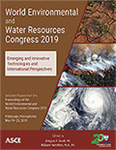World Environmental and Water Resources Congress 2019
Analysis of Barriers on Integrated Flood Risk Management in Metro Manila, Philippines, by Interpretive Structural Modeling Approach
Publication: World Environmental and Water Resources Congress 2019: Emerging and Innovative Technologies and International Perspectives
ABSTRACT
The adaptation of integrated flood risk management (IFRM) approach in the Philippines is a challenging task due to heavy reliance of traditional structural measures in the past. And so, there are critical issues or “barriers” that hamper the adaptation of IFRM. This study presents for the first time a framework in identifying the barriers on IFRM in a case-specific approach focusing on a megacity of a developing country such as Metro Manila, Philippines. Moreover, this framework presents a systematic approach in analyzing the barriers on IFRM by interpretive structural modelling. This study was able to identify a total of 12 barriers that encompasses governance, social, and technological resources aspects in Metro Manila, Philippines. The results show that barriers on the governance aspect are the most influential barriers while barriers on the social aspect have the least influence to other barriers.
Get full access to this article
View all available purchase options and get full access to this chapter.
REFERENCES
Agi, M.A.N., Nishant, R. (2017). “Understanding influential factors on implementing green supply chain management practices: An interpretive structural modelling analysis.” J. Environ. Manage., 188, 351–363.
Albert, J.R.G., Yasay, D.B., Gaspar, R.E. (2016). “Examining Processes in Research and Development at the Department of Science and Technology” (No. 2016-04), PIDS Discussion Paper Series. Makati City, Philippines.
Attri, R., Dev, N., Sharma, V. (2013). “Interpretive Structural Modelling (ISM) approach: An Overview”. Res. J. Manag. Sci. 2, 3–8.
Ballesteros, M.M. (2010). “Linking Poverty and the Environment: Evidence from Slums in Philippine Cities (No. 2010–33)”, PIDS Discussion Paper Series. Makati City, Philippines.
Bankoff, G. (2003). “Constructing vulnerability: The historical, natural and social generation of flooding in metropolitan Manila.” Disasters. 27(3), 224–238.
Chandramowli, S., Transue, M., Felder, F.A. (2011). “Analysis of barriers to development in landfill communities using interpretive structural modeling.” Habitat Int. 35(2), 246–253.
DPWH, 2013. Master Plan for Flood Management in Metro Manila and Surrounding Areas. DPWH, 2004. The Study on Flood Control Project Implementation System for Principal Rivers.
dos Muchangos, L.S., Tokai, A., Hanashima, A. (2015). “Analyzing the structure of barriers to municipal solid waste management policy planning in Maputo city, Mozambique.” Environ. Dev., 16, 76–89.
Farris, D.R., Sage, A.P. (1975). “On the use of interpretive structural modeling for worth assessment.” Comput. Electr. Eng., 2(2-3), 149–174.
Gilbuena, R., Kawamura, A., Medina, R., Amaguchi, H., Nakagawa, N. (2013a). “Gap analysis of the flood management system in Metro Manila, Philippines : a case study of the aftermath of Typhoon Ondoy.” Floods From Risk to Oppor., 357, 32–40.
Gilbuena, R., Kawamura, A., Medina, R., Amaguchi, H., Nakagawa, N., Bui, DuD. (2013b). “Environmental impact assessment of structural flood mitigation measures by a rapid impact assessment matrix (RIAM) technique: A case study in Metro Manila, Philippines.” Sci. Total Environ., 456, 137–147.
Gilbuena, R., Kawamura, A., Medina, R., Nakagawa, N., Amaguchi, H. (2013c). “Environmental impact assessment using a utility-based recursive evidential reasoning approach for structural flood mitigation measures in Metro Manila, Philippines.” J. Environ. Manage., 131, 92–102.
Lagmay, A.M.F., Racoma, B.A., Aracan, K.A., Alconis-Ayco, J., Saddi, I.L. (2017). “Disseminating near-real-time hazards information and flood maps in the Philippines through Web-GIS.” J. Environ. Sci., 59, 13–23.
Mudgal, R.K., Shankar, R., Talib, P., Raj, T. (2010). “Modelling the barriers of green supply chain practices: an Indian perspective.” Int. J. Logist. Syst. Manag., 7(1), 81–107.
Porio, E. (2011). “Vulnerability, adaptation, and resilience to floods and climate change-related risks among marginal, riverine communities in Metro Manila.” Asian J. Soc. Sci., 39(4), 425–445.
Ravi, V., Shankar, R., Tiwari, M.K. (2005). “Productivity improvement of a computer hardware supply chain.” Int. J. Product. Perform. Manag., 54(4), 239–255.
Saaty, R.W. (1987). “The analytic hierarchy process-what it is and how it is used.” Math. Model., 9(3-5), 161–176.
Saaty, T.L. (2004). “Fundamentals of the analytic network process — Dependence and feedback in decision-making with a single network.” J. Syst. Sci. Syst. Eng., 13(2), 129–157.
Shatkin, G. (2004). “Planning to forget: Informal settlements as “forgotten places” in globalising Metro Manila.” Urban Stud,.41(12), 2469–2484.
Singh, M.D., Shankar, R., Narain, R., Agarwal, A. (2003). “An interpretive structural modeling of knowledge management in engineering industries. J. Adv. Manag. Res., 1(1), 28–40.
Thakkar, J., Kanda, A., Deshmukh, S.G. (2008). “Interpretive structural modeling (ISM) of IT-enablers for Indian manufacturing SMEs.” Inf. Manag. Comput. Secur., 16(2), 113–136.
Warfield, J.N. (1973). “Binary Matrices in System Modeling.” IEEE Trans. Syst. Man. Cybern., 5, 441–449.
Watson, R.H. (1978). “Interpretive structural modeling—A useful tool for technology assessment?” Technol. Forecast. Soc. Change., 11(2), 165–185.
Zoleta-Nantes, D.B. (2000). “Flood hazards in Metro Manila: Recognizing commonalities, differences and courses of action.” Soc. Sci. Diliman., 1(1), 60–105.
Information & Authors
Information
Published In
World Environmental and Water Resources Congress 2019: Emerging and Innovative Technologies and International Perspectives
Pages: 152 - 161
Editors: Gregory F. Scott and William Hamilton, Ph.D.
ISBN (Online): 978-0-7844-8232-2
Copyright
© 2019 American Society of Civil Engineers.
History
Published online: May 16, 2019
Authors
Metrics & Citations
Metrics
Citations
Download citation
If you have the appropriate software installed, you can download article citation data to the citation manager of your choice. Simply select your manager software from the list below and click Download.
